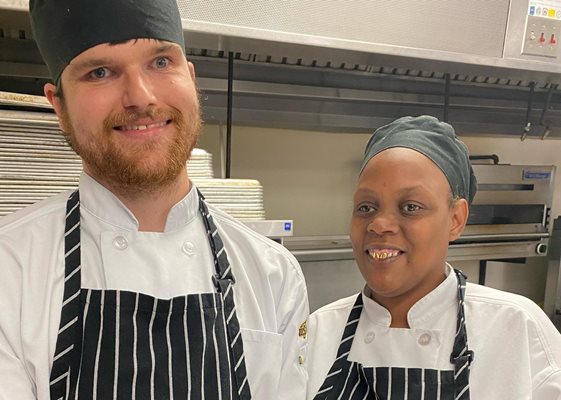Envision Employees Blaze Trails for Students Who are BVI at WSU Tech NICHE
By Holly Herring • Nov 30, 2022

Blog Content
Envision has partnered with WSU Tech to create a first-of-its-kind innovation kitchen and culinary education opportunity designed to help meet the career goals of people who are blind or visually impaired.
Among those involved on behalf of Envision are Deyounka Nelson and Charlie Wilks. Deyounka works in manufacturing while Charlie has been a Customer Care Specialist at Envision’s Workforce Innovation Center. Deyounka has been accepted as a student chef in the WSU Tech NICHE program with a full-ride scholarship and Charlie consults as an accessibility specialist for the program.
“To be accepted into the program is a dream come true,” said Nelson. “It’s a breath of fresh air and I am grateful. I have been cooking since I was nine years old, but I have already learned so much since starting the program this past fall.” Deyounka dreams of owning her own restaurant one day – a place that is dedicated to kids with entertainment, favorite foods and affordable prices.
Since renovations aren’t complete yet, classes have been held in the Boston Recreation Center. However, students will move to the new building in January 2023. Deyounka says she is nervous, curious and excited about the new facility. Nervous only because she will have to learn how to navigate in the new space.
Charlie is helping the college improve the experience of the students who are blind or visually impaired by giving them firsthand feedback and perceptions about the program. He is participating in the classes while working with the chefs to make suggestions and adaptions as needed without compromising the standard of excellence for people within the program. His focus is on teaching them how to turn sighted processes into tactile and auditory processes as much as possible.
“The faculty at WSU Tech are doing something amazing,” said Wilks. “It’s not about ‘can’t’ but more about ‘how’ to make it all possible. Everyone here understands that it is not blindness that cripples someone – it is often the restrictions that others put on you. We are making adaptions as needed that don’t lower standards for anyone.”
